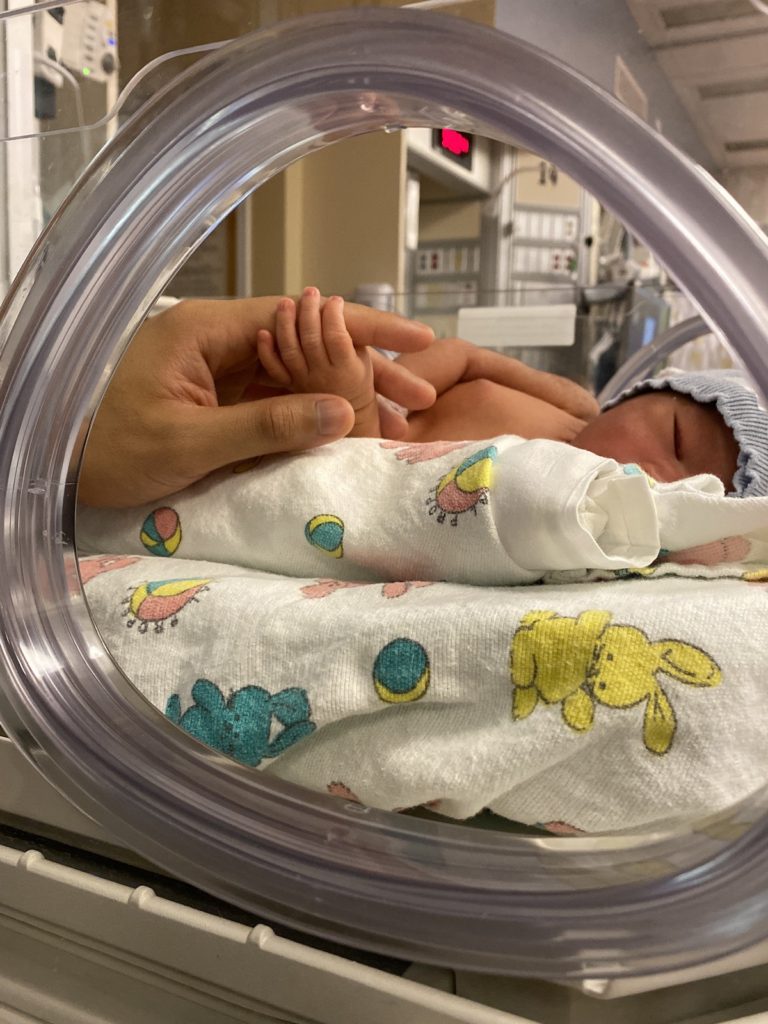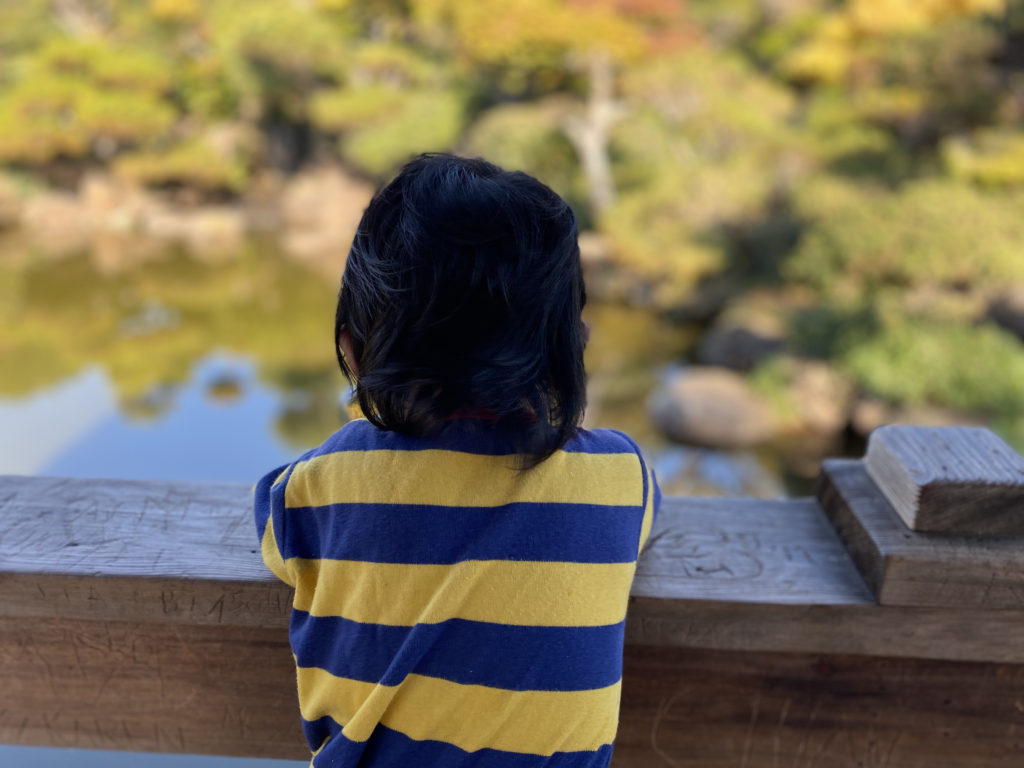The drive to the hospital was quick, feeling final in its initial doing, though we’d go on to repeat it several times a day. “Come back when you grimace like that with every contraction,” said the nurse, dismissing both my pain and my strength. But pandemic restrictions meant that my husband and I were navigating the start of parenthood alone, and without the unwavering advocacy and stubborn persistence of my never-accepts-a-no Mamá, we went home.
Hours later, back in the examination room, two more nurses checked my cervix, one after the other, each saying it was still too soon. Panic ensued, and I made the switch from patient to lawyer, advocating on my own behalf. I insisted they call someone to check again. A third practitioner checked my cervix, frantically exclaimed that I was fully dilated, probably had been for some time, and that it was likely too late for an epidural. This baby would not wait. I was wheeled away, my own knowing of my body finally validated.

The hours that followed the delayed admission were the calmest of our journey. Our son came without much hesitation, eager to join us. We spent the next 36 hours in that blurred state of bliss and worry that comes with the birth of a first child. Obsessing over every one of our baby’s movements, we began noticing an unusual rhythmic motion on his left side. “Babies make all sorts of funny movements,” they told us. Unsatisfied, and concerned that our intuition was being dismissed once again, we filmed our newborn the next time his tiny frame jerked and jerked.
When the pediatrician returned to our room, ready to discharge us, I showed her the video, which she immediately took down to the NICU. Within minutes, she returned our phone and took our baby.
Panic ensued, and I made the switch from patient to lawyer, advocating on my own behalf.
“Your son suffered multiple in utero strokes, damaging both sides of his brain, causing him to seize,” said the NICU doctors, once they’d run a multitude of analyses. The prognosis? Unknown. We were to wait and see, practice cautious optimism, and under no circumstances Google it. With nodes forming a maze on our baby’s head to monitor brain activity, we pressed our hands against his skin as we listened and nodded, hoping he felt our presence through the thick fog of medication.
In the days that followed, my husband and I glued ourselves to each other. We ate off each other’s plates. We shared my hospital bed. And when they sent the two of us home to a hollow, baby-less apartment, we lived in a tight orbit of each other. We gripped hands as we walked the hospital hallways, ensuring that, at the very least, we would not be separated. When the togetherness was not enough, we cried an emptying, aching cry to rid ourselves of the worry and grief that we could not physically endure. But each time we entered the NICU, our tears turned to resolve.
With my own infancy in Tehran marked by bomb sirens, my Mamá shielding her babies in a blacked-out basement where she kept a second crib, I chose a legal career to help those who had been systemically denied peace reclaim it. And now, my own motherhood called on me to spring to action, blending the personal and professional. On alert that advocacy may be a necessity in receiving adequate and responsive healthcare, my husband and I combined our unique skills for the sake of our son—his, as an organizer who galvanizes collective action through individualized attention, and mine, as a disarming lawyer who blends kindness and curiosity in pursuit of more just outcomes.
We were to wait and see, practice cautious optimism, and under no circumstances Google it.
We developed a routine in our new roles as health advocates for our son, setting a timer to visit the NICU during each shift change and morning and afternoon rounds, totaling five visits a day, with spurts of sleep and pumping sessions in between. We used the drive to the hospital to review whom we had spoken to, what we had learned, and any test results and related questions. We practiced a purposefully calm demeanor, knowing that an adversarial approach may lead to a defensive limitation of information. In order for our son to receive exceptional care from the very hospital that had ignored my pain during a standard exam the day prior, we needed to be on the same team.
We made sure everyone knew our names, and that we knew theirs. We paid special attention to the nurses, just as my husband’s late mother, also a nurse, had taught him to do. We gained their trust with witty banter and caring questions about their lives. We charted their shifts, names, and relevant facts. We welcomed them with every shift change and wished them well at the end of their day. By day two, each nurse greeted us with a warm, familiar smile, hugs, and quick updates about our son before we could even ask.
We absorbed all that the NICU team could teach us, learning physical therapy methods, how to look out for potential asymmetry in our son’s movements, and the increased importance of speaking with our baby often and directly to develop his language abilities. Our compassionate demeanor put the medical staff at ease, and our short visits with our son’s neonatal doctor began to turn conversational. She set aside an extended period of time at the end of her rotation to offer a longer explanation and hopeful stories of children with similarly damaging strokes. She made a call to secure the pediatric neurologist we preferred, and offered out-of-protocol assistance. “I don’t usually give out copies of the MRI,” she explained, handing over the images of our baby’s brain, speckled with damage on both sides.

The glaring lights of the NICU softened as our son’s healthcare providers became family, standing in for the one the pandemic had prevented from visiting. What we missed in not having my Mamá present, we received in a tireless lead nurse who willed our baby to be released days earlier than expected, and a crash course on parenting, complete with anecdotal stories from the nurses and doctors about their own children.
“Model parents,” they called us, as we took our son home, a remarkable five days later. Efforts to show both our vulnerability and strength, and to recognize theirs, had humanized a healthcare system that had days earlier relegated us to the kind of routine care that too often jeopardizes the health of mothers of color and ignores their pain.
“Things like this happen,” the specialists told us, “and many times, we just don’t know why,” their words offering little closure to a new mother grappling both with her body’s inability to keep her child safe and her worry that a hospital’s failure had caused her son lasting damage. But amid the immediacy of the NICU, the months of shuttling our baby to follow-up care, and the monitoring of movements and milestones, there has been, graciously, little room for wondering why and what if.
In order for our son to receive exceptional care from the very hospital that had ignored my pain during a standard exam the day prior, we needed to be on the same team.
Now a toddler, our son spends his days in search of all that is new. Free from the medication that once slowed his brain to prevent him from seizing, he boldly explores his world, seemingly unaware of his daunting entry into it. He often stops to press his body against mine, his cheek on my cheek, short arms wrapped as best they can around me. Sure of the safety of his Mamá’s embrace, he breathes me in, freeing me from my retrospective worry, illuminating the necessity of now.
And, while we’d have much preferred to go without the agony of his first days, weeks, and months, and without the years of living in the wait-and-see, we can’t help but feel fortunate—for the care he received, for the parents we learned to be, and for the extra love he demands we give.
